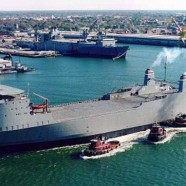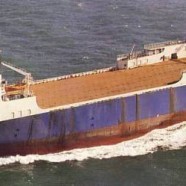Stocamine* and Cigéo** in the Same Boat
*Stocamine at Wittelsheim near Mulhouse was a center for deep Storage- 550 meters- for non-recyclable and non-radioactive toxic waste in a salt bed. Between February 1999 and September 2002, 44,000 tons of waste has been stored there.
** Cigéo is at the borders of the Meuse and Haute-Marne is an in depth storage project – 500 meters – for non-recyclable radioactive waste in a layer of clay.
In 1997, the prefectural authorization for Stocamine included a 30-year operation and demanded removal of the after that term except in case of an authorization renewal. Reversibility was accompanied by technical and financial provisions ensuring, at any time, the withdrawal of all or some of the waste.
Destruction of Syrian Chemical Weapons n°3
The U.S. Cape Ray is heading towards the Mediterranean Sea.
Its mission is to destroy onboard the so-called priority one substances from Syrian chemical weapons at sea in international waters. For the moment the Field Deployable Hydrolysis System (FDHS) has only been tested, at sea… with water. The FDHS was constructed to be operated on land. Robin des Bois has already voiced opposition to this option favoured by the OPCW and the United States (See information note n°1 and n°2).
The Cape Ray scenario has been put in place to “avoid having to put these materials on somebody’s territory where you have to deal with all the political and environmental conditions associated with doing that under local law” as Mr. Frank Kendall the US. Under Secretary of Defence said early January. However, this option of not neutralising chemical weapons in somebody’s back yard will actually take place in everybody’s back yard. The high seas are the common heritage of mankind.
Destruction of Syrian Chemical Weapons n°2
Neutralizing Syrian chemical weapons on board the Cape Ray, a cargo ship converted into an industrial platform, situated in international waters will make it possible to avoid national regulations.
This worldwide first will transform the high seas into a free zone, free from any democratic controls and environmental and social constraints. The OPCW and the United States state that 500 tonnes of Syrian’s priority substances will be treated at sea in a couple of weeks whereas the final destruction of America’s chemical weapons will not be finished before 2023. On land, the United States is hoping to treat 3,100 tonnes in 10 years. At sea, they are convinced that they can treat 500 tonnes within 4 weeks.
Destruction of Syrian Chemical Weapons
Update January 3, 2014 – 10:15 AM
Treatment of Syrian chemical substances onboard the American ship Cape Ray is a default solution. It follows Northern European countries’ refusal to directly dispose of the precursor chemical ammunition in specialized facilities (*). This operation on the high seas would install industrialization of the world’s oceans.
How Does France Manage Old Chemical Weapons?
Update
October 14, 2013 : a ministerial decree permits ASTRIUM to build SECOIA at Mailly-le-Camp.
—————————–
For 13 years, Robin des Bois has been working on the war waste issue including chemical weapons. Considering the current state of development it seems useful to review the doctrine and the actual practice of France in relation to the international Convention on the Prohibition of the Development, Production, Stockpiling and Use of Chemical Weapons and on their Destruction known as the Chemical Weapons Convention. The majority of chemical weapons to be destroyed on French territory were made with phosgene and chloropicrin, mustard gas and chlorobenzene, zinc tetrachloride, arsenic and cyanide.
Alang in the Lot
They work without masks, without gloves, shirtless, and with cigarettes in their mouths, making skin contact with the poisonous fumes they abundantly inhale. This is neither in Alang (India) nor in Bangladesh; it is at Laval-de-Cère, a town bordering the Massif Central, at the edges of the Cère, a tributary of the Dordogne. For ten years, Sidénergie has been transforming creosoted railway sleepers into coal for barbecue, thanks to a waiver granted by the French Superior Council of Public Hygiene.











